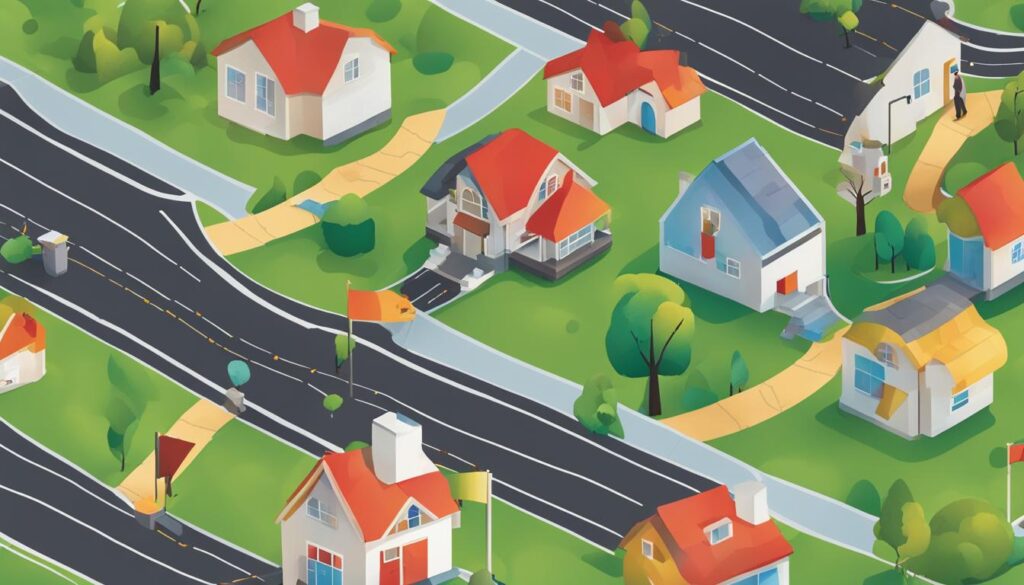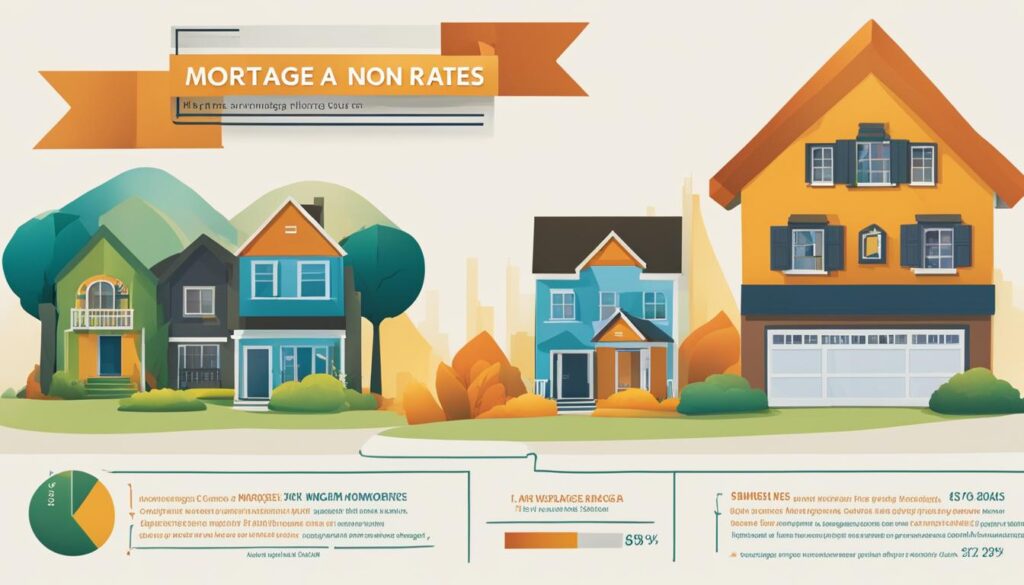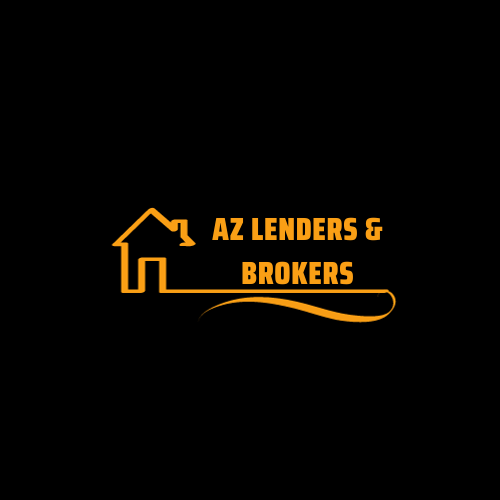Are you tired of getting the runaround from traditional lenders when trying to secure a mortgage? Maybe you don’t fit the strict requirements for a conventional mortgage, or you’re self-employed and don’t have traditional income documentation. Whatever your situation may be, non QM loans (also known as non-qualified mortgage loans or alternative mortgage loans) may be the solution you’ve been looking for.
In this article, we will guide you through the world of non QM loans, explore the benefits and options available to you, and introduce you to non-qualified mortgage lenders who offer alternative mortgage loans. Whether you’re a first-time homebuyer or an experienced real estate investor, understanding non QM loans can help you make informed decisions about your financial future.
Key Takeaways:
- Non QM loans, or non-qualified mortgage loans, are alternative mortgage options for borrowers who don’t meet the requirements for traditional mortgages.
- Non QM loans offer more flexibility than traditional mortgages, allowing for alternative income documentation and unique property types.
- Non QM loans can have higher interest rates and require larger down payments due to the increased risk for lenders.
- Non-qualified mortgage lenders specialize in offering alternative mortgage options and can guide you through the non QM loan application process.
- Understanding non QM loans and their requirements can help you determine if this alternative mortgage option is right for your financial situation.
Understanding Non QM Loans: A Comprehensive Overview
If you are in the market for a mortgage, you are likely familiar with traditional mortgage options. However, non-qualified mortgage (non QM) loans are also available and may be a viable option for certain borrowers.
Non-qualified mortgage loans differ from traditional mortgages in that they do not meet the standards set by the Consumer Financial Protection Bureau (CFPB) for qualified mortgages. This means that non QM loans may have different requirements and qualifications needed to secure them.
One key difference between traditional mortgages and non QM loans is the qualification criteria. While traditional mortgages require borrowers to meet strict qualifications such as a high credit score, low debt-to-income ratio, and consistent and documented income, non QM loans may have more flexible qualification requirements. For example, lenders may be willing to approve borrowers with lower credit scores or who have non-traditional sources of income, such as business owners or the self-employed.
In addition to more flexible qualification requirements, non QM loans offer a variety of loan programs and options to choose from. Some common non QM loan programs include bank statement loans, asset depletion loans, and interest-only loans. These loan programs may be beneficial for borrowers who do not meet the strict requirements of traditional mortgages or who need a more customized mortgage solution.
It is important to note that non QM loans typically come with higher interest rates than traditional mortgages. This is because they are considered riskier investments for lenders. However, non QM loans may still be a good option for certain borrowers who cannot qualify for traditional mortgages or who need a more customized loan solution.
Overall, understanding the definition and differences between traditional mortgages and non QM loans is an important step in choosing the right mortgage for your needs. Keep in mind that non QM loans may have different qualification requirements, loan programs, and interest rates than traditional mortgages. However, they may also offer more flexibility and customization options for certain borrowers.

Exploring Non QM Loan Programs and Options
Non QM loans offer a variety of programs and options for borrowers who may not qualify for traditional mortgage loans. These alternative mortgage loans can be a good fit for self-employed individuals, those with unconventional income sources, or those with a less-than-perfect credit history.
There are several types of non QM loan programs available:
- Bank statement loans
- Asset depletion loans
- Interest-only loans
- Foreign national loans
Bank statement loans require borrowers to provide proof of income by showing bank statements over a period of time. With asset depletion loans, borrowers can use their assets (such as stocks, bonds, or retirement accounts) to demonstrate their ability to make mortgage payments. Interest-only loans allow borrowers to pay only the interest on the loan for a specified period of time.
In addition to these programs, non QM lenders also offer options for borrowers with credit issues or other challenges. For example, some lenders may have lower credit score requirements, or may be willing to consider non-traditional sources of income.
If you are interested in exploring non QM loan programs and options, it is important to shop around and compare lenders. Look for lenders who specialize in non QM loans and have a track record of successful lending. Additionally, make sure you understand the terms and requirements of each program before committing to a loan.

Different Types of Non QM Loans
Bank statement loans are designed for self-employed individuals who may not have traditional pay stubs or W-2 forms. Instead, borrowers provide bank statements to demonstrate their income over a set period of time. Asset depletion loans allow borrowers to use their assets, such as stocks, bonds, or retirement accounts, to demonstrate their ability to make mortgage payments. This can be an option for individuals who may have a lot of assets but limited income.
Interest-only loans allow borrowers to pay only the interest on the loan for a set period of time, after which they must begin to pay both interest and principal. This can be a good option for borrowers who need to keep their monthly payments low initially, or who anticipate a change in their financial situation in the future.
Foreign national loans are designed for non-US citizens who wish to purchase property in the United States. These loans may have different requirements and terms than traditional mortgage loans, and may require additional documentation.
Non QM lenders also offer options for borrowers with credit issues or other challenges. For example, some lenders may have lower credit score requirements, or may be willing to consider non-traditional sources of income.
Non QM Mortgage Guidelines: What You Need to Know
Non-qualified mortgage loans are a unique alternative to conventional mortgage options. Unlike traditional mortgages, non QM loans are not subject to the same underwriting guidelines set by Fannie Mae and Freddie Mac. Instead, individual lenders set their own guidelines for non QM loans.
If you are considering applying for a non QM loan, it’s important to understand the guidelines and requirements set by lenders. While the guidelines vary from lender to lender, there are some common requirements you can expect.
Credit Score
Lenders typically require a minimum credit score of 500 for non QM loans. However, keep in mind that a higher credit score can increase your chances of approval and result in better interest rates and terms. You can check your credit score for free on websites like Credit Karma or through your credit card company.
Debt-to-Income Ratio
Lenders will also consider your debt-to-income (DTI) ratio when evaluating your non QM loan application. Ideally, your DTI should be below 43%. However, some lenders may be more flexible with this requirement, especially if you have a strong credit history and income.
Documentation
Non QM lenders typically require more documentation than traditional lenders. This may include bank statements, tax returns, and proof of income. It’s important to be prepared with all the necessary documentation to ensure a smooth application process.
While non QM loans may have more flexible guidelines than traditional mortgages, it’s important to remember that they are still subject to underwriting and approval processes. It’s a good idea to shop around and compare lenders to find the one that offers the best rates and terms for your financial situation.

Keep in mind that non QM loans may come with higher interest rates and fees than traditional mortgages due to the increased risk to lenders. However, they can be a valuable option for borrowers who don’t meet the strict guidelines of conventional mortgage programs.
Navigating the Non QM Loan Application Process
Once you have identified the non QM loan programs that suit your needs, it’s time to navigate the application process. This can seem overwhelming, but with the right guidance, it can be a smooth and easy process. Here are some steps to help you along the way:
Step 1: Find the right lender
The first step is to find a non-qualified mortgage lender that offers the loan program you are interested in. There are many non QM mortgage lending options out there, so it’s important to conduct research and compare rates. Make sure to look for lenders who are experienced and reputable in the industry to ensure a smooth application process.
Step 2: Gather your documentation
Non QM mortgage lending requires documentation of your income, assets, and other financials. Make sure to gather all the necessary paperwork to support your application. This may include bank statements, tax returns, and other financial records.
Step 3: Submit your application
Once you have found the right lender and gathered your documentation, it’s time to submit your application. The application process is similar to that of traditional mortgages, but non QM mortgages may have additional requirements to consider. Your lender will provide guidance on what is needed.
Step 4: Wait for underwriting and approval
After you have submitted your application, the lender will undertake underwriting and assessment to determine if you are eligible for the non QM loan program. Underwriting includes an assessment of your creditworthiness and ability to repay the loan. The lender will also consider the property’s value and appraisals. Keep in mind that the underwriting process for non QM mortgages may be more detailed and complex than traditional mortgages.
Step 5: Closing
If you have been approved for the non QM loan program, the final step is closing on the loan. This involves signing the loan documents and completing the final paperwork. Once the loan is closed, you can begin enjoying the benefits of your non QM mortgage!
Remember, the non QM loan application process may be more complex than traditional mortgages, but the benefits can be well worth it. With the right lender and guidance, you can successfully navigate the process and secure your ideal mortgage.

Understanding Non QM Mortgage Rates and Terms
If you’re looking for alternative mortgage loans, non QM loans are definitely a viable option to consider. However, before making any major financial decisions, it’s important to understand the interest rates and terms of these loans.
The interest rates for non QM loans tend to be higher than traditional mortgage loans. This is because non-qualified mortgage lenders take on more risk by lending to borrowers who don’t meet the strict requirements of traditional mortgages. That being said, interest rates for non QM loans can vary widely depending on the lender, the type of loan, and your financial situation.
When it comes to the terms of non QM loans, they can be more flexible than traditional mortgage loans. For example, some non QM loans may have interest-only payment options or may allow for a higher debt-to-income ratio. These loans can also have shorter or longer repayment terms, providing more customization options for borrowers.
When comparing non QM mortgage rates and terms, it’s important to keep in mind your financial needs and goals. Take the time to shop around and compare lenders to find the best mortgage option for you.

Tip: When considering non QM loans, make sure to factor in the costs associated with the loan, such as higher interest rates and potential fees. Consider your long-term financial goals and whether a non QM loan aligns with them.
Non QM Mortgage Underwriting: What to Expect
When you apply for a non QM loan, you will go through an underwriting process that is different from a traditional mortgage. Non-qualified mortgage lenders evaluate you based on your unique financial situation rather than the strict requirements set by traditional lenders.
The non QM mortgage underwriting process typically involves a more thorough review of your finances. Lenders will assess your credit score, income, assets, and debt-to-income ratio to determine if you qualify for a non QM loan and at what interest rate.
One significant difference in non QM mortgage underwriting is that lenders will often consider alternative sources of income or assets that may not be included in a traditional mortgage underwriting process. For example, if you are self-employed, your lender may consider your bank statements or other records to verify your income.
Additionally, non QM mortgage underwriting is often more flexible when it comes to credit history. While traditional lenders typically require a high credit score, non-qualified mortgage lenders may be more lenient if you have a lower score but can demonstrate financial responsibility in other ways.
What to Expect During Underwriting
During the non QM mortgage underwriting process, you can expect to provide a variety of documentation to your lender. This may include:
- Recent tax returns and W-2 forms
- Bank statements and financial records
- Proof of employment and income
- Documentation of any other assets
Your lender may also request additional information or documentation throughout the underwriting process to ensure they have a complete picture of your financial situation.
Overall, non QM mortgage underwriting is more flexible and can be a great option for borrowers who don’t fit the strict requirements of traditional mortgages. If you’re interested in a non QM loan, take the time to find a reputable non-qualified mortgage lender and prepare to provide detailed documentation throughout the underwriting process.

Finding the Right Non QM Lenders for Your Needs
Choosing the right non-qualified mortgage lender is crucial for securing the best mortgage for your financial situation. With numerous non QM loan programs available, it’s essential to find a lender who can help you navigate the process and provide you with tailored solutions.
Here are some tips to help you find the right non QM lenders:
Do Your Research
Take the time to research non-qualified mortgage lenders who offer the loan programs you need. Look for lenders with a reputation for transparency and excellent customer service. Check online reviews and ratings, and ask for recommendations from friends and family who have gone through the non QM loan process.
Compare Rates and Terms
Once you have identified potential lenders, compare their rates and terms to find the best deal. Keep in mind that non QM loan rates and terms can vary widely from lender to lender, so it’s crucial to compare multiple options to find the best match for your needs.
| Lender | Loan Program | Interest Rates | Loan Terms |
|---|---|---|---|
| ABC Mortgage | Bank Statement Loan | 5.25% | 5-year ARM |
| XYZ Lending | Asset Depletion Loan | 6.5% | 30-year Fixed |
| 123 Finance | Interest-Only Loan | 7% | 10-year ARM |
Table: A sample comparison of non QM loan programs from different lenders. Rates and terms are subject to change.
Check Qualifications
Before applying for a non QM loan, make sure you meet the qualifications set by the lender. Typically, non-qualified mortgage lenders require a higher credit score and a lower debt-to-income ratio than traditional lenders. You may also need to provide more extensive documentation to support your application.
Ask Questions
Don’t be afraid to ask questions and clarify any doubts you may have. A good non QM lender will be open and transparent, providing you with all the information you need to make an informed decision.
By following these tips, you can find the right non-qualified mortgage lender and secure the ideal loan program for your needs.

Benefits of Non QM Loans: Is It Right for You?
If you’re looking for an alternative mortgage option, non-qualified mortgage loans, also known as non QM loans, may be the solution you need. These loans are designed for borrowers who don’t meet the strict qualification requirements of traditional mortgages. Here are some of the benefits of non QM loans that may make them the right choice for you:
- Flexible qualifying criteria: Unlike traditional mortgages, non QM loans don’t have strict qualification requirements. This means that borrowers who have unique financial situations, such as self-employed individuals or those with non-traditional incomes, may still be able to qualify.
- Higher loan limits: Non QM loans often have higher loan limits than traditional mortgages, which can be advantageous if you’re looking to finance a high-value property.
- Interest-only options: Some non QM loans offer interest-only payment options, which can be a useful tool for borrowers who need to manage cash flow or who have variable income.
- Greater flexibility: Non QM loans offer a greater degree of flexibility than traditional mortgages. This includes options such as bank statement loans, which use bank statements instead of tax returns to verify income, and asset depletion loans, which use assets such as retirement savings to help qualify borrowers.
However, it’s important to keep in mind that non QM loans come with their own set of potential drawbacks and risks, including higher interest rates and fees. It’s crucial to carefully consider your financial situation and goals before deciding if a non QM loan is the right choice for you.

“Non QM loans often have higher loan limits than traditional mortgages, which can be advantageous if you’re looking to finance a high-value property.”
Exploring the Pros and Cons of Non QM Loans
As with any financial decision, it’s essential to weigh the pros and cons carefully. Non QM loans offer many benefits, such as more flexible eligibility requirements and a greater range of options, but they also have their drawbacks. Let’s take a closer look.
Pros of Non QM Loans
- Flexibility: Non QM loans offer a wider range of eligibility requirements, making them an excellent choice for borrowers who don’t meet traditional mortgage lending standards. These loans are also more flexible when it comes to credit scores, income verification, and debt-to-income ratios.
- Alternative sources of income: Non QM loans take into account unconventional sources of income, such as self-employment earnings, investments, and rental income, broadening the pool of eligible borrowers.
- Mortgage size: Non QM loans often have higher loan limits than traditional mortgages, allowing borrowers to purchase higher-priced homes or refinance existing larger loans.
- Specialized loans: Non QM loans offer specialized loan programs, such as bank statement loans or asset depletion loans, for borrowers with unique financial situations.
Cons of Non QM Loans
- Higher interest rates: Non QM loans typically come with higher interest rates than traditional mortgages to offset the increased risk for lenders. This can result in higher monthly payments and overall costs.
- Stricter terms: Non QM loans often come with stricter terms, such as higher down payment requirements or shorter loan terms, which can make them less accessible for some borrowers.
- Higher fees: Non QM loans often carry higher fees, such as origination fees and closing costs, which can add up quickly and increase the overall cost of the loan.
- Riskier loan: For lenders, non QM loans pose a higher risk due to the looser eligibility requirements and specialized loan programs. As a result, they may have stricter underwriting requirements, which can make the application process more challenging.

It’s essential to weigh the pros and cons carefully before deciding if a non QM loan is right for you. Depending on your financial situation, a non QM loan can offer the flexibility and options you need to secure your ideal mortgage.
Conclusion
Congratulations! You have now gained a comprehensive understanding of non-qualified mortgage loans, also known as alternative mortgage loans. You have learned about the variety of loan programs and options, the application process, and the guidelines and requirements set by lenders.
Armed with this knowledge, you are now in a better position to navigate the non-qualified mortgage lending market and make an informed decision about which option suits your financial needs best.
Non QM Loans Offer Flexibility and Options
Non QM loans offer flexibility and options to borrowers who may not qualify for traditional mortgages. These alternative mortgage loans can be a viable solution for self-employed individuals, retirees, and those with less-than-perfect credit scores.
With non QM loans, you may be able to secure a mortgage even if you have inconsistent income, a high debt-to-income ratio, or irregular employment history.
Pros and Cons of Non QM Loans
As with any financial decision, there are pros and cons to consider. Non QM loans can be a great solution for some borrowers, but they may not be the best choice for everyone.
On the plus side, non QM loans offer more flexibility, simplified application processes, and more options for borrowers with unique financial situations.
However, non QM loans can come with higher interest rates and fees, stricter qualification requirements, and potentially higher risks for lenders.
Consider Non QM Loans for Your Mortgage Needs
If you find yourself in need of a mortgage but are struggling to qualify for a traditional loan, non-qualified mortgage loans may be worth considering.
Research and evaluate various non QM lenders to find the best option for your financial situation. With the right lender and loan program, a non QM loan can be the key to securing your dream home.
FAQ
What are non QM loans?
Non QM loans, also known as non-qualified mortgage loans, are alternative mortgage options that do not meet the traditional standards set by government agencies. They are designed for borrowers who may not qualify for conventional mortgages due to factors like unconventional income sources or a high debt-to-income ratio.
What are the benefits of non QM loans?
Non QM loans offer flexibility in terms of income verification and credit requirements. They cater to borrowers with unique financial situations, such as self-employed individuals or those with recent credit events. Additionally, non QM loans provide an opportunity to secure a mortgage when traditional options may not be available.
How do non QM loan programs differ from traditional mortgage options?
Non QM loan programs have different underwriting guidelines compared to traditional mortgage options. They may consider alternative income verification methods, such as bank statements or asset depletion, and have more lenient credit score requirements. Non QM loans also often offer interest-only or adjustable rate options.
What are the requirements for obtaining a non QM loan?
The specific requirements for non QM loans can vary depending on the lender and the loan program. Generally, lenders will consider factors such as credit history, debt-to-income ratio, employment stability, and documentation of income. It’s important to work with a trusted non-qualified mortgage lender to understand the specific qualifications.
How do I apply for a non QM loan?
To apply for a non QM loan, start by researching and identifying lenders who offer these loan programs. Gather all the necessary documentation, which may include tax returns, bank statements, and proof of assets. Contact the lender directly to initiate the application process, and they will guide you through the required steps.
Are the interest rates on non QM loans higher compared to traditional mortgages?
Non QM loan interest rates can vary depending on various factors, including the borrower’s creditworthiness and the specific loan program. While it’s possible for non QM loans to have slightly higher interest rates, they can also offer competitive rates depending on market conditions. It’s important to compare rates from different lenders to find the best option for you.
How long does the underwriting process for a non QM loan take?
The underwriting process for a non QM loan can vary depending on the lender and the complexity of the borrower’s financial situation. Typically, it may take longer than the underwriting process for a conventional mortgage due to the additional documentation and criteria involved. It’s best to consult with your lender for an estimated timeline.
How do I find the right non QM lender for my needs?
Finding the right non QM lender involves conducting thorough research and comparing various lenders and their loan programs. Consider factors such as interest rates, loan terms, customer reviews, and the lender’s reputation. It’s also recommended to work with a lender who specializes in non QM loans and has experience catering to borrowers with similar financial profiles.
Are non QM loans suitable for everyone?
Non QM loans are not suitable for everyone. They are designed for borrowers who may not qualify for traditional mortgage options due to specific circumstances. Before considering a non QM loan, it’s important to assess your financial situation, consider the potential benefits and drawbacks, and consult with a mortgage professional to determine if it aligns with your needs.
What are the pros and cons of non QM loans?
Pros of non QM loans include flexibility in income verification, catering to unique financial situations, and providing an opportunity to secure a mortgage when traditional options are not available. However, cons may include potentially higher interest rates, stricter underwriting criteria, and limited lender options. It’s important to weigh these factors against your specific circumstances before deciding on a non QM loan.

